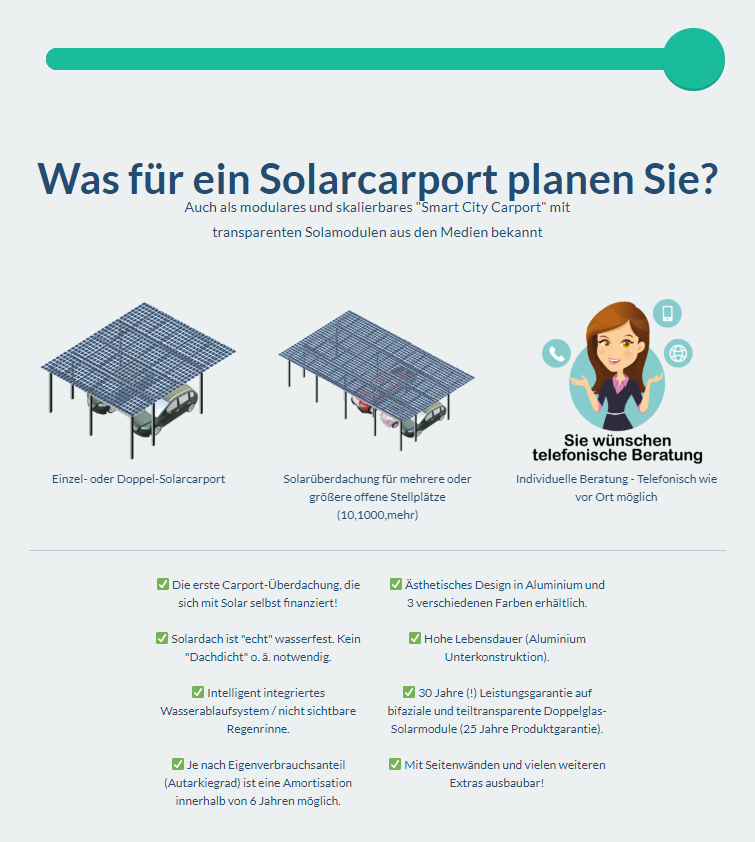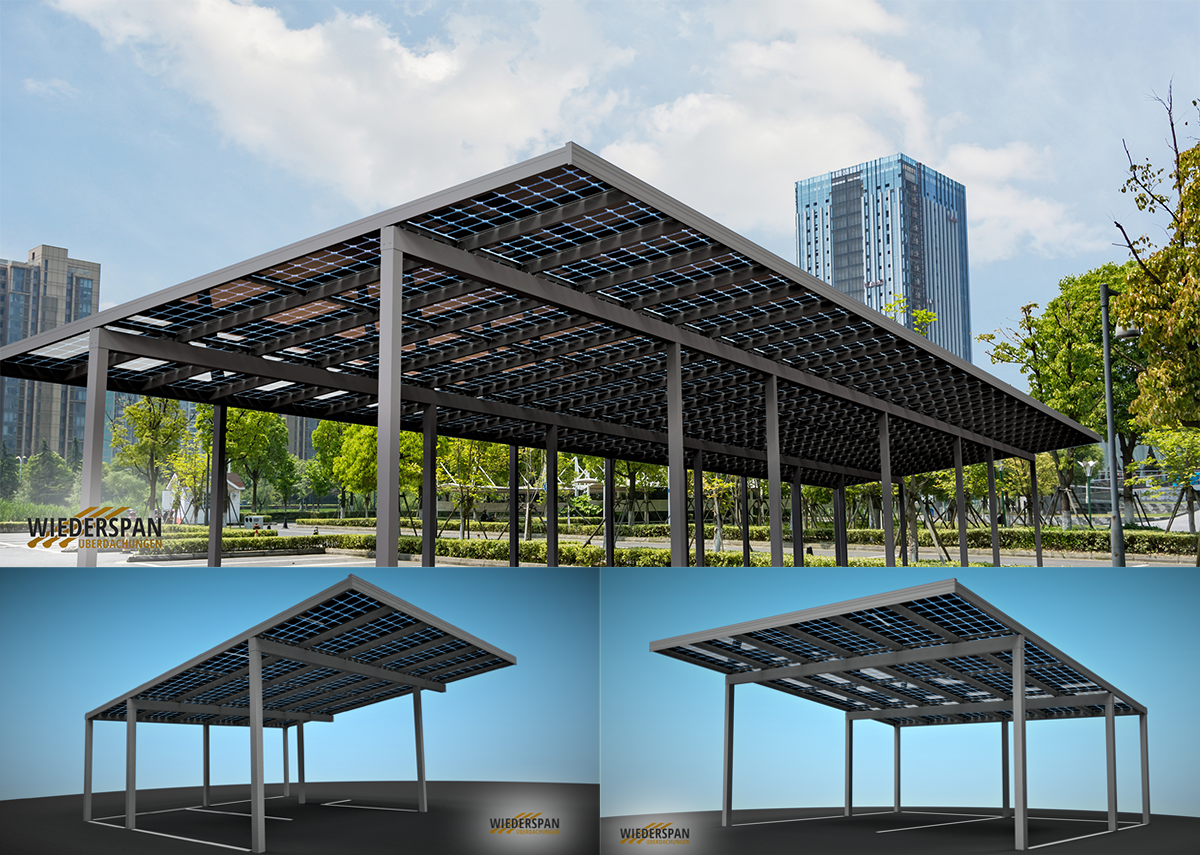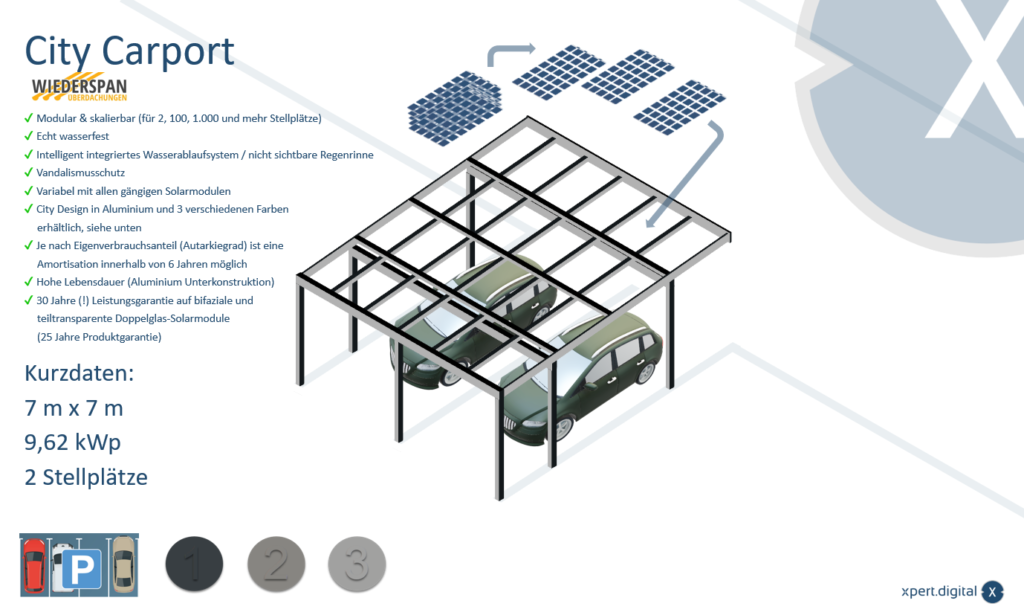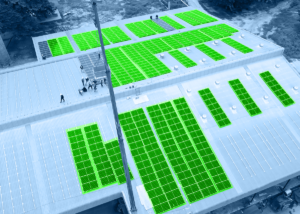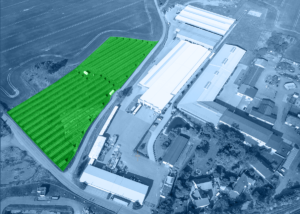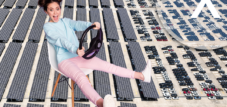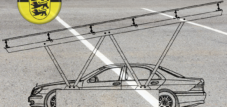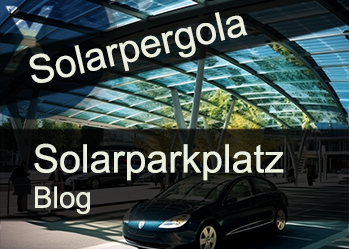Olaf Scholz & electric cars: E-charging stations will be mandatory for e-vehicles at gas stations I boost for solar parking spaces & carports
Language selection 📢
Published on: September 13, 2023 / update from: September 13, 2023 - Author: Konrad Wolfenstein
🚗🚗🚗 Electromobility on the rise 🗒️
The announcement by Chancellor Olaf Scholz that he will introduce a law requiring gas station operators to provide fast-charging options for electric cars is undoubtedly a significant step towards more sustainable mobility in our country.
The announcement by Chancellor Olaf Scholz at the International Motor Show (IAA) in Munich shows that the German government sees electromobility as a future-oriented alternative in the transport sector. With the obligation of 80 percent of all gas stations to provide fast charging options with at least 150 kilowatts for electric cars, the range anxiety of electric car drivers will be significantly reduced. This is a crucial step to increase the acceptance of electric vehicles in Germany.
📈 Impact on the market
The introduction of such a law will undoubtedly have a significant impact on the electromobility market. Gas station operators must invest in infrastructure to meet the requirements of the law. This also opens up new business opportunities for companies that specialize in expanding charging stations. This push is expected to further boost the electric vehicle market.
🌍 Germany as a pioneer
With this announcement, Germany is sending a strong signal in the international context. As the first country in Europe to introduce such a far-reaching obligation, Germany is positioning itself as a pioneer in electromobility. This could encourage other countries to take similar measures and accelerate the transition to more sustainable transport.
🔌 Challenges and opportunities
Implementing such a law will certainly pose challenges. Gas station operators must make significant investments to provide the necessary infrastructure. There will also be questions about the financing and operation of these charging stations. On the positive side, however, this also opens up opportunities for innovative solutions in the area of charging infrastructure and new business opportunities.
🌟 Sustainable mobility
The announcement by Chancellor Olaf Scholz is a significant step towards more sustainable mobility in Germany. It shows the government's commitment to electromobility and the expansion of the charging infrastructure. This will not only increase the acceptance of electric vehicles, but also further drive the electric mobility market. Germany is positioning itself as a pioneer in Europe, and this could have a positive impact on the development of electromobility worldwide.
📣 Similar topics
- Electromobility in Germany: A new law changes the rules of the game 🇩🇪
- Gas stations are changing: The future belongs to electromobility ⛽
- Germany is setting standards: fast charging options for electric cars are becoming mandatory 🚀
- Challenges and opportunities: The expansion of the charging infrastructure 💡
- International impact: Germany as a pioneer of electromobility 🌎
- Electromobility on the rise: What does this mean for the car market? 🚘
- Innovative solutions: The future of charging infrastructure 🔌
- Financing and operation: How are the charging stations financed? 💰
- Electromobility worldwide: Which countries could follow? 🌍
- Sustainable mobility: The path to an environmentally friendly future 🌱
#️⃣ Hashtag: #Electromobility #Sustainability #Charginginfrastructure #OlafScholz #IAA
Development of the e-charging station requirement in Germany 🚗⚡ with solar systems such as solar parking spaces and solar caports
Development of the e-charging station requirement in Germany 🚗⚡
The introduction of compulsory electric charging stations at gas stations and the promotion of private charging points in combination with solar systems are crucial steps to promote electromobility in Germany. In this article, we take a close look at these developments and how they can overcome range anxiety for electric cars.
The obligation to have electric charging stations at gas stations
The introduction of compulsory electric charging stations at gas stations is a significant step towards improving the charging infrastructure for electric vehicles. This concept is expected to help reduce range anxiety for electric cars. According to information from an SPD politician, the state development bank KfW is planning a program in the fall that will promote the installation of private charging points in combination with solar systems, solar parking spaces and solar carports as well as storage systems. This is a promising step to advance electromobility in Germany.
The importance of the e-charging station requirement
The requirement for electric charging stations can help to lower the inhibition threshold for buying electric vehicles. With a comprehensive infrastructure of charging stations at gas stations, it will be easier for electric car owners to charge their vehicles. This is a crucial factor in minimizing range anxiety and increasing confidence in electric mobility.
The role of the state development bank KfW
The state development bank KfW plays a key role in the implementation of this initiative. Your program to promote private charging points in conjunction with solar systems is promising. The combination of charging stations and renewable energy from solar systems is not only environmentally friendly, but can also reduce the overall cost of charging electric vehicles.
Current charging stations in Germany
According to available information, there are currently 90,000 public and 700,000 private charging stations in Germany. This shows that there are already a significant number of charging options. The planned introduction of a further 300,000 private stations is a further sign of the growth of electromobility in Germany.
The future of electromobility in Germany
The developments in the area of mandatory e-charging stations and the promotion of solar systems in combination with charging points are promising. They point to a promising future for electromobility in Germany. These measures can help overcome range concerns for electric cars and promote sustainability in the transport sector.
Environmental benefits 🌱
The integration of solar systems into the charging point infrastructure not only offers advantages for electromobility, but also for the environment. The use of renewable energy sources reduces CO2 emissions and helps reduce the environmental impact of transport.
Insight into the planning
The information that 300,000 more private charging stations are being planned is encouraging. This shows that both the government and the private sector in Germany are investing heavily in electromobility. This will further strengthen the charging infrastructure and increase the acceptance of electric vehicles.
The importance of saving
Integrating storage into the charging point concept is a clever move. Storage solutions can help use electricity more efficiently and reduce the costs of operating charging stations. This is a further step towards more sustainable electromobility.
The role of politics
The fact that an SPD politician shared this information shows that politics plays a crucial role in promoting electromobility. Cooperation between the government and business is crucial to advance electromobility in Germany.
Summary and outlook 🚀
Overall, the developments in the area of mandatory e-charging stations and the promotion of solar systems in combination with charging points are extremely promising. They can help overcome range concerns for electric cars, reduce environmental impact and promote electromobility in Germany. The planned introduction of 300,000 private charging stations is a sign of the growing interest and commitment in this area.
📣 Similar topics
- Development of the e-charging station requirement in Germany 🚗⚡
- The importance of the e-charging station requirement
- The role of the state development bank KfW
- Current charging stations in Germany
- The future of electromobility in Germany
#️⃣ Hashtags: #Electromobility #Charging station requirement #Solar systems #Sustainability #Environmental protection
The Xpert.Solar solar carport planner
Solar parking spaces are a promising way to generate renewable energy while optimizing limited space requirements in cities and urban areas. However, there are actually some challenges that can complicate the introduction of such parking spaces.
One of the biggest hurdles is the high cost and planning effort associated with installing solar panels in parking lots. Not only must the cost of the solar panels themselves be taken into account, but also the cost of the infrastructure required to connect the panels to the grid. In addition, the space required for installing the solar modules must be precisely planned and coordinated to ensure effective use of the available space.
Another obstacle are bureaucratic hurdles and approval processes that can make it difficult to install solar panels in parking lots. Depending on the region or country, different rules and regulations may apply, which can complicate the approval and implementation process.
Despite these challenges, there is high demand for solar parking spaces as they represent an effective way to promote renewable energy while optimizing space requirements in urban areas. With careful planning and collaboration between the parties involved, the hurdles can be overcome to facilitate the introduction of such parking spaces.
➡️ We specialize in providing advisory and planning support for such solar carport projects and advancing their implementation.
➡️ With our solar carport planner we simplify the process.
➡️ We are there for you for the next steps and thus minimize costs and effort for you.
More about it here:
Tailor-made energy projects: AC/DC or just DC-side planning and installation also for third parties - let us help you achieve your goals
More about it here:
🗒️ The future of electromobility in Germany 🚗⚡
The recent statements by Olaf Scholz, the Chancellor of Germany, on promoting electric cars and achieving the goal of 15 million electric cars by 2030 raise important questions. In this section we will examine the various aspects of this topic and take a closer look at Scholz's statements and current developments in the German electric car industry.
Scholz 'Vision: 15 million e-cars by 2030 🎯
Olaf Scholz has once again emphasized that Germany wants to put 15 million electric cars on the roads by 2030. This is undoubtedly an ambitious goal that promotes the transition to more sustainable mobility. Scholz argues that electric cars are already economically more attractive than conventional gasoline or diesel vehicles because the operating costs are significantly lower. The price of gasoline compared to electricity per 100 kilometers is almost three times higher, which underlines the cost-effectiveness of electric cars.
Challenges on the way to the goal 🛣️
Although Scholz is optimistic, reality warns of challenges on the way to realizing this goal. A main factor is state support for the purchase of electric cars. This year, the Federal Government has reduced or dismantled state purchase premiums, which could affect the attractiveness of the purchase of electric cars. This contradicts Scholz's efforts to launch cheaper electric cars.
Another problem is the limited supply of inexpensive electric cars with sufficient range. Vehicles under 30,000 euros that offer an acceptable range are still rare. This can hinder the widespread acceptance of electromobility in Germany.
The role of car manufacturers 🚘
Scholz also appeals to car manufacturers to offer more affordable electric cars. The automotive industry plays a crucial role in achieving the 15 million target. It is important that they develop affordable models to appeal to a wide range of buyers. In this regard, companies such as Volkswagen, Opel and Renault have announced that they will launch affordable entry-level models in the coming years. This could make a positive contribution to achieving the goal.
The importance of government support 💰
In order to achieve the goal of 15 million electric cars by 2030, it is essential that the federal government continues to financially support electric mobility. Experts emphasize that government subsidies for the purchase of electric cars are still necessary to stimulate demand. This could also help shorten the time it takes for an average electric car to pay for itself.
The role of the IAA revelations 🚀
The International Motor Show (IAA) has special significance in this context. Companies such as Volkswagen, Opel and Renault have announced that they will introduce cost-effective entry-level models. These announcements could stimulate the market for electric cars in Germany and encourage more people to switch to electric mobility.
Similar topics 📣
- Electromobility in Germany: Scholz 'vision and reality
- On the way to 15 million electric cars: The challenges for Germany
- Car manufacturers in focus: Affordable electric cars for the masses
- Government support and electromobility: A crucial connection
- IAA revelations: New impulses for the German electric car industry
- Electromobility in Germany: Between vision and reality
- Electric cars for everyone: The role of car manufacturers
- Electromobility in Germany: The path to the 15 million target
- Government subsidies and electric cars: A key to achieving the goal
- IAA 2023: The future of electromobility in Germany
#️⃣ Hashtags: #Electromobility #OlafScholz #IAA2023 #Electriccars #SustainableMobility
Our favorite city solar carport or solar carport module
The advantages at a glance
- Support & Made in Germany
- Modular & scalable (for 2, 100, 1,000 and more parking spaces)
- Really waterproof
- Integrated water drain / invisible rain gutter
- Vandalism protection, optionally with integrated impact protection
- Variable with all common solar modules
- City design available in aluminum and 3 different colors
- Depending on the amount of self-consumption (degree of self-sufficiency), amortization is possible within 6 years
- Long service life (aluminum substructure)
- 30-year (!) performance guarantee on bifacial and partially transparent double-glass solar modules (25-year product guarantee)
- Reducing urban heat islands
- Building-integrated photovoltaics
- Ideal for transparent and translucent double-glass solar modules with overhead mounting approval!
🗒️ German car industry and Chinese competition
In his speech at the International Motor Show (IAA) in Munich, Chancellor Scholz also dismissed fears of Chinese competition in the electric car market. He emphasized the competitiveness of the German auto industry and pointed out that many European and Chinese cars come from German manufacturers. This underlines the strength of the German automotive industry.
Affordable electric cars
One of Chancellor Scholz's central messages was the need to offer affordable electric cars. He pointed out that electric cars already offer advantages in terms of operating costs, as electricity is significantly cheaper compared to gasoline. However, it is crucial that electric cars are also affordable in terms of purchase price. The announcement by Volkswagen, Opel and Renault that they will offer affordable entry-level models is therefore an important step in the right direction.
Challenges for the German automotive industry
Despite these positive developments, there are also challenges for the German automotive industry. Hildegard Müller, head of the Association of the Automotive Industry (VDA), expressed concerns about Germany's competitiveness in the field of e-mobility. Excessively high energy costs, taxes, bureaucracy and a lack of security for raw materials could lead to companies preferring investments abroad. It is therefore important to overcome these obstacles and improve the framework conditions for the German e-car industry.
Don't be afraid of China: competition on the electric car market
In a world in which electromobility is becoming increasingly important, the question arises as to how German car manufacturers should deal with competition from China. The answer to this is far from fear, but rather an asset to the market.
Why the fear of Chinese electric car manufacturers is unfounded
The concerns that Chinese electric car manufacturers are represented in large numbers at the International Motor Show (IAA) and want to gain market share in Europe are understandable. There have been similar concerns in the past about competition from Japan and later Korea. But instead of fear, German car manufacturers should see this competition as an incentive.
Japanese, Korean and Chinese competition: A success story for the German auto industry
In recent decades, the German auto industry has proven that it is able to successfully compete with competitors from Asia. When Japanese automakers began entering the European market in the 1970s and 1980s, many were concerned. But German car manufacturers used this challenge to improve and become more innovative. The result? German cars are still world leaders.
Later, Korea entered the market with manufacturers such as Hyundai and Kia. Here too, there were initial doubts, but German car manufacturers invested in research and development in order to remain competitive. The result was a wider range of cars and a stronger position in the global market.
The opportunities of the competition: innovation and diversity
The presence of Chinese electric car manufacturers at the IAA should not be seen as a threat, but as an opportunity. Competition forces German companies to remain innovative and constantly improve. This ultimately benefits consumers as they benefit from new technologies and better products.
In addition, the variety in the market brings benefits to buyers. Different manufacturers offer different models to suit different needs and preferences of customers. This leads to more choice and more opportunities to find the perfect electric car.
Chinese electric car manufacturers are on the rise
It is undeniable that Chinese EV manufacturers have experienced an impressive rise in recent years. Companies like NIO, Xpeng and BYD have developed electric cars that can compete with the best German competitors in terms of performance, range and technology. This is a sign of the progress and innovative strength of the Chinese auto industry.
Cooperation instead of confrontation
Instead of fearing Chinese competition, German car manufacturers should consider the possibility of cooperation. Collaborations can be both economically and technologically advantageous. This could enable the exchange of know-how and resources, ultimately benefiting both sides.
The importance of the EU strategy
The European Union has already recognized the importance of supporting the domestic auto industry while dealing fairly with foreign competitors. The EU strategy to promote electromobility and ensure European competitiveness should form the basis for the future. It will ensure that competition remains fair and environmental impact is minimized.
The role of consumers
Ultimately, it is in the hands of consumers which cars are successful. The demand for environmentally friendly electric cars is constantly growing, and the choice between German and Chinese brands should be based on individual needs and preferences. Consumers have the power to shape the market.
Not afraid of China, but open to opportunities
The presence of Chinese electric car manufacturers at the IAA should not be viewed as a threat to the German auto industry. Rather, it is an opportunity to drive innovation, increase diversity in the marketplace and ultimately provide consumers with better options. German car manufacturers have proven in the past that they can successfully compete with foreign competition, and there is no reason why this should not continue to be the case in the future.
📣 Similar topics
- 📣 The future of electromobility: Using Chinese competition as an opportunity
- 🚗 Chinese electric cars on the rise: Why German manufacturers shouldn't be afraid
- 🔌 Innovation through competition: How Chinese electric car manufacturers are changing the market
- 🤝 Cooperation instead of confrontation: The future of the German-Chinese auto industry
- 🌍 The IAA and global electromobility: A new era of competition
- 🔋 Electromobility in Europe: The EU strategy and its impact on the market
- 🛒 The power of consumers: How buyers are shaping the electric car market
- 🇨🇳🆚🇩🇪 Chinese vs. German e-car manufacturers: An analysis of the competition
- 🚀 Electromobility 2.0: How Chinese innovations are revolutionizing the market
- 🌱 Sustainable mobility: opportunities and challenges in the e-car market
#️⃣ Hashtags: #Electromobility #ChineseCars #GermanAutoindustry #IAA #Innovations
📣 Parking areas solar solutions for industry, retail and municipalities
Everything from a single source, specially designed for solar solutions for large parking areas. You refinance or counterfinance into the future with your own electricity generation.
🎯 For solar engineers, plumbers, electricians and roofers
Advice and planning including a non-binding cost estimate. We bring you together with strong photovoltaic partners.
👨🏻 👩🏻 👴🏻 👵🏻 For private households
We are positioned across regions in German-speaking countries. We have reliable partners who advise you and implement your wishes.
🗒️ E-charging stations will be mandatory for e-vehicles at gas stations 🌞 Boost for solar parking spaces & solar carports🚗
The introduction of e-charging stations as a requirement at filling stations for e-vehicles is a significant step towards sustainable mobility. This project could not only promote the spread of electric cars, but also focus on renewable energies such as solar energy.
E-charging stations at gas stations: A necessity for the future 🌐
The decision to make e-charging stations at gas stations mandatory is an important step to promote electromobility in Germany. This will undoubtedly reduce range anxiety and increase the appeal of electric vehicles.
Boost for renewable energies 🌞
The integration of solar parking spaces and carports into this initiative is a remarkable step. This can help further reduce the ecological footprint of electric cars and promote renewable energy. Solar energy is an environmentally friendly option that is abundant in Germany.
The advantages of introducing e-charging stations at gas stations 🌟
The introduction of e-charging stations at gas stations offers numerous advantages:
1. Promoting electromobility
This will help increase the adoption of electric cars and accelerate the transition to environmentally friendly vehicles.
2. Reducing CO2 emissions
Electric cars have lower emissions than conventional combustion vehicles. The spread of e-charging stations reduces environmental impact.
3. Boost for renewable energy
The integration of solar systems in parking lots and carports promotes the use of solar energy and helps reduce dependence on fossil fuels.
4. Comfort and convenience
The availability of charging stations at gas stations makes long-distance electric car journeys more practical and stress-free.
Outlook on the future of electromobility 🌐
With the introduction of electric charging stations at gas stations and the promotion of renewable energies, Germany will further expand its position as a pioneer in electromobility. This will not only improve environmental performance, but also boost the economy as demand for electric vehicles and renewable energy will increase.
📣 Similar topics
- The future of mobility in Germany: How e-charging stations are driving electromobility forward.
- Sustainable energy sources for electric cars: The role of solar parking spaces and carports.
- The advantages of electromobility: Why electric cars are the environmentally friendly choice.
- E-charging stations at gas stations: A milestone for electromobility in Germany.
- The role of government in promoting renewable energy: How political decisions drive the energy transition.
#️⃣ Hashtags: #Electromobility #Sustainability #RenewableEnergy #Electriccars #Fuel stations
- Warehouses, production halls and industrial halls with their own power source from a photovoltaic roof system - Image: NavinTar|Shutterstock.com
- Industrial plant with its own power source from an outdoor photovoltaic system - Image: Peteri|Shutterstock.com
- Plan solar systems with photovoltaic solutions for freight forwarding and contract logistics
- B2B solar systems and photovoltaic solutions & advice
- Plan photovoltaics for warehouses, commercial halls and industrial halls
- Industrial plant: Plan a photovoltaic open-air system or open-space system
- Plan solar systems with photovoltaic solutions for freight forwarding and contract logistics
- B2B solar systems and photovoltaic solutions & advice
We are there for you - advice - planning - implementation - project management
From simple solar carports to large systems: with Xpert.Solar your individual solar carport advice
I would be happy to serve as your personal advisor.
You can contact me by filling out the contact form below or simply call me on +49 89 89 674 804 (Munich) .
I'm looking forward to our joint project.
Xpert.Digital - Konrad Wolfenstein
Xpert.Digital is a hub for industry with a focus on digitalization, mechanical engineering, logistics/intralogistics and photovoltaics.
With our 360° business development solution, we support well-known companies from new business to after sales.
Market intelligence, smarketing, marketing automation, content development, PR, mail campaigns, personalized social media and lead nurturing are part of our digital tools.
You can find out more at: www.xpert.digital - www.xpert.solar - www.xpert.plus




